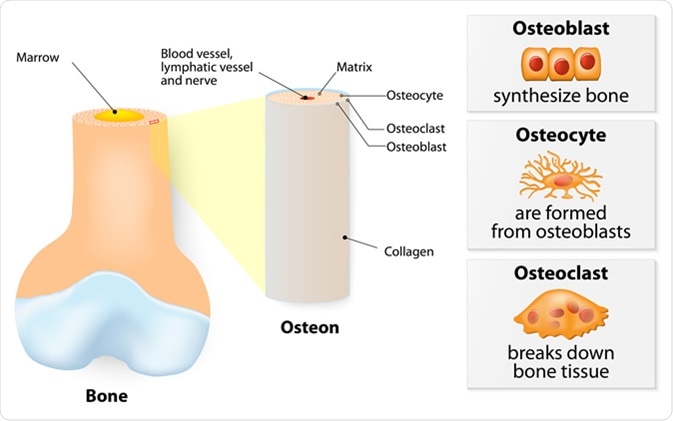Skip to:

Fresh fruits and vegetables containing vitamin K. Image Credit: Ratmaner / Shutterstock
Types of Vitamin K and Health Benefits
Vitamin K is important in the blood coagulation process via the modification of protein molecules. Although the side chains of the isoprenoid units in the vitamin K molecule are different in length, the enzyme γ-glutamyl carboxylase uses them for the activation of specific proteins. These proteins, including prothrombin, are involved in blood coagulation and bone metabolism as well as the inhibition of calcification in soft tissues.
The two main types of vitamin K are vitamin K1 and vitamin K2. Both types are vital for the maintenance of bone and cardiac health as well as in hemostasis. Several studies have reported more health benefits with vitamin K2 than with vitamin K1. It contributes to skin health and bone metabolism, promotes proper brain function and prevents heart-related diseases. Furthermore, vitamin K2 is important in the body’s use of calcium to help build bones and to inhibit blood vessel calcification. Vitamin K2 is found in animal foods and preserved foods. It does not exist in junk food or in restrictive Western diets. Vitamin K2 may also be found in cereals, fatty meat, eggs and fish. Some bacteria in the large intestine are also known to synthesize vitamin K2.
The Role of Vitamin K2 in Bone Metabolism
Human bone consists of a thin hard outer membrane (periosteum), which covers a soft spongy matrix lined with blood and lymphatic vessels. The skeleton undergoes constant turnover, so that it is completely replaced every seven to ten years. During the remodeling process, calcium from the bone is transferred to the bloodstream. The replacement of calcium is regulated by osteoblasts and osteoclasts.

Internal structure of a bone. 3 types of cells are found within bone tissue: Osteoblasts, Osteocytes and Osteoclasts. Image Credit: Designua/ Shutterstock
Osteocalcin is a molecule produced by osteoblasts, which takes up calcium and delivers it to the bone matrix. However, osteocalcin can only be activated by vitamin K2. This shows the significance of vitamin K2 in the formation of human bones. Osteocalcin is also known to trigger the formation of dentin, the calcified tissue in teeth. Therefore, vitamin K2 is important for the maintenance of healthy teeth.
Additionally, trials have demonstrated that vitamin K2 inhibits bone loss even in bone-related diseases. One study tested the level of the vitamin in patients suffering from osteoporosis. It was reported that even in these cases, new bone fractures were prevented, and bone strength was increased, with increased intake of vitamin K2 supplements. Although the exact mechanism is not fully understood, it is suggested that the acceleration of the γ-glutamate carboxylation of osteocalcin might play an important role.
Vitamin K2 and the Prevention of Cardiovascular Diseases
The other vital role of vitamin K2 is in the inhibition of calcification in blood vessels and maintaining heart health. Vitamin K2 prevents damage to the blood vessels as it activates matrix GLA protein (MGP), which inhibits calcification of blood vessels. Vitamin K2 deficiency therefore results in uncarboxylated or inactive MGP leading to cardiovascular disease. Another role of vitamin K2 is in blood coagulation. K2 is required for the synthesis of specific proteins that take part in blood coagulation, which prevents internal and external bleeding.
Health Benefits of Increased Vitamin K2 Intake
The deficiency of vitamin K2 leads to non-activation of MGP, which restricts the removal of calcium from blood vessels and increases the risks of blood vessel calcification, and eventually of cardiovascular disease. To ensure a healthy heart and prevent complications due to calcification, a daily intake of at least 32mcg of vitamin K2 should be ingested through one’s diet.
Additionally, vitamin K2 also helps to maintain the elasticity of the blood vessels, which reported to be beneficial in postmenopausal women in some clinical trials. According to one study, the intake of vitamin K2 supplements in these women also led to a slower age-related decrease in bone mineral density.
It is also important to take enough K2 through the diet or in supplement form to prevent bleeding. Vitamin K2 is known to act as a coagulant and its deficiency can have fatal consequences, especially during accidents. As children are more prone to vitamin K deficiency, the American Academy of Pediatrics recommends that it be given at birth. This can prevent hemorrhagic complications such as intracranial haemorrhage, brain damage and death of the newborn. For adults a daily intake of between 100-300 mcg vitamin K2 is recommended. Furthermore, it should be taken with vitamin D3 as both these vitamins are reported to have synergistic effects, inhibiting the osteoclast cells which are responsible for bone resorption.
Further Reading
Last Updated: Aug 25, 2019